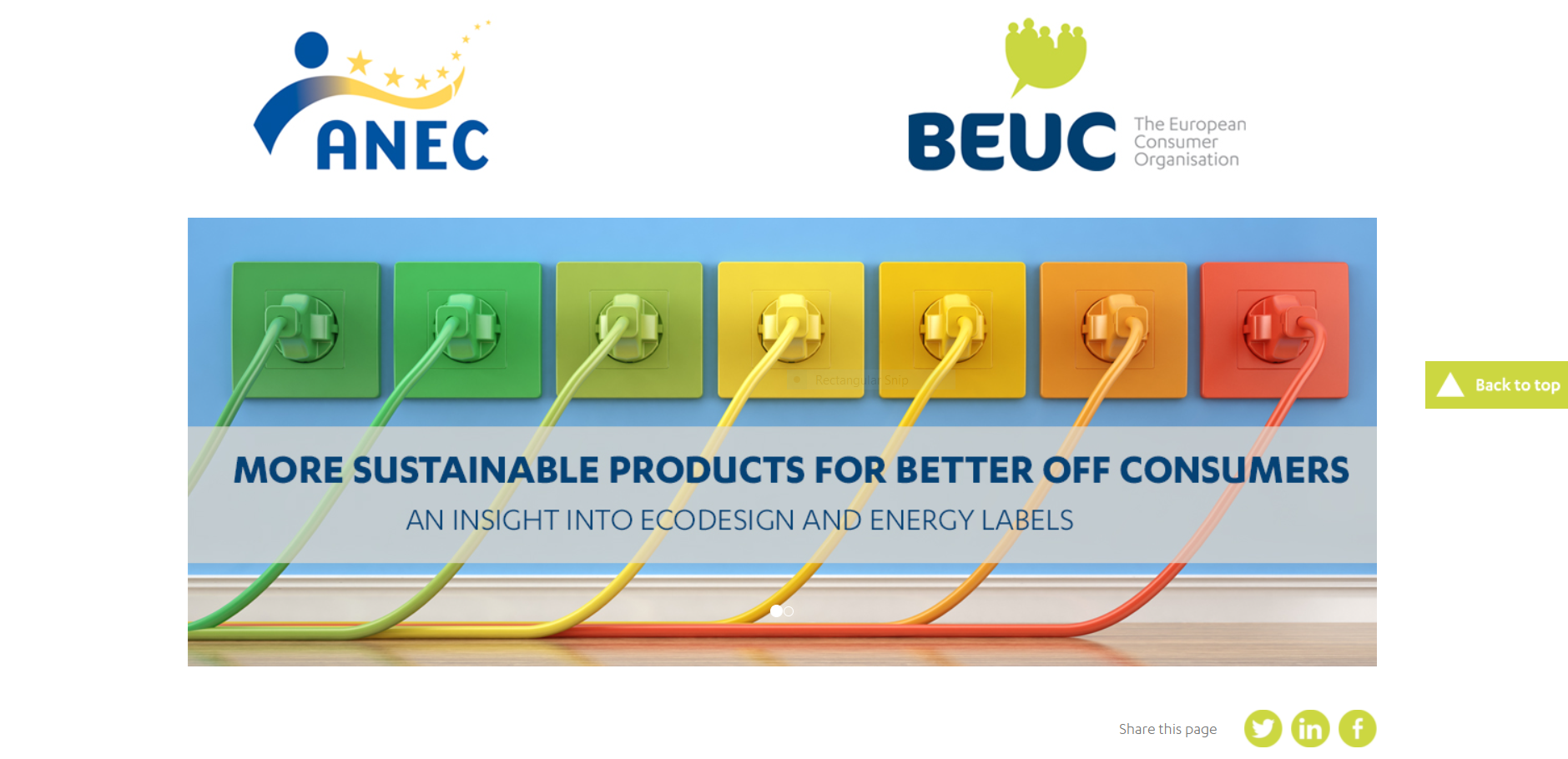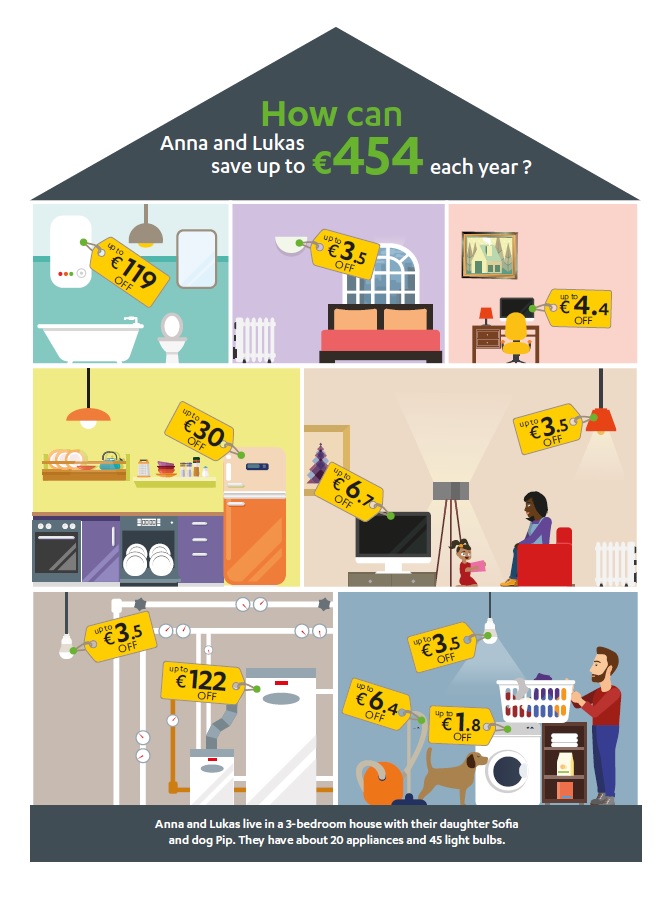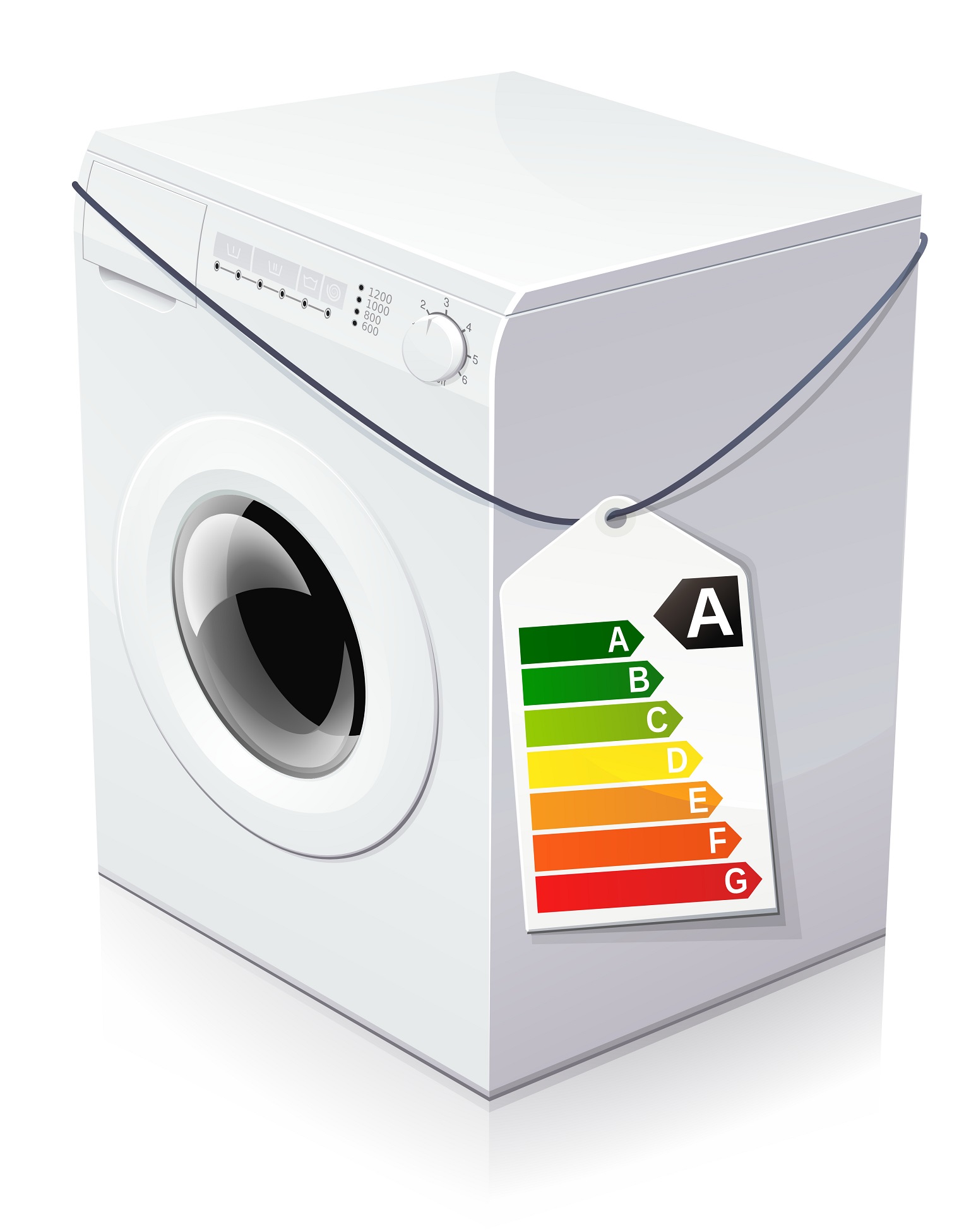
For ANEC, Energy is a cross-cutting issue affecting several fields - Sustainability, Domestic Appliances and Digital Society.
In cooperation with its partners BEUC and ECOS, ANEC has been implementing several projects in the area of Energy Efficiency to ensure energy-related products, related regulations and standardisation for these as well as for smart energy systems deliver major benefits for consumers and the environment.
The Energy Labelling Regulation 2017/1369, and the Ecodesign Directive 2009/125/EC, are complementary EU policies. While Ecodesign takes the least-performing energy-related products out of the market, the Energy label enables consumers to make informed choices when buying an appliance. ANEC supports the overarching goals lying behind the two policies, contributes and follows developments closely.
Work Areas
Implementation of Ecodesign and Energy Labelling legislation
As a partner in a European consortium project, ANEC ensures the representation of consumer interests in the implementation of the Ecodesign Directive (2005/32/EC) as well as of the Energy Labelling Regulation (2017/1369). The overall goal of this three-year project is to ensure that the points of view of European consumers are well represented in the preparatory process leading to implementing measures under the Ecodesign Directive and the Energy labelling Regulation both in the project phase of the various preparatory studies and in the Consultation Forum.
For information on the consortium representing consumer interests in the Ecodesign process, and to access ANEC/BEUC position papers, please visit the Ecodesign website.
Ecodesign
With the Ecodesign Directive (2009/125/EC), the European Commission is addressing energy-using and energy-related products that have considerable impacts on the environment and on the energy consumption in the internal market. The Ecodesign process addresses ways to improve the environmental performance of many consumer products, such as washing machines, TVs and vacuum cleaners, by assessing environmental aspects over the entire lifecycle, taking into consideration which improvements are feasible.
Thanks to Ecodesign transforming the market by removing the least-performing products from sale, consumers are saving money annually, as demonstrated by a study commissioned by ANEC and BEUC on the benefits of Ecodesign to the average household, and confirmed in the Study updated by BEUC in 2023. In addition to limiting the energy consumption of products and bringing financial benefits, some of the latest Ecodesign rules adopted since 2019 have introduced requirements in new areas such as durability (e.g., minimum lifetime of products), repairability (e.g., availability of spare parts) and upgradeability.
Consumers looking for sustainable and durable products struggle to find suitable options due to the prevalence of short-lived and difficult-to-repair items in the market. This situation impacts both consumers' finances and the environment. The review of the Ecodesign framework is an opportunity to address this issue and ensure that all products placed on the EU market become more sustainable by design. ANEC and BEUC provided the consumer perspective to the legislators on how the Ecodesign for sustainable Products Regulation should look like for consumers in our joint ANEC-BEUC Position Paper: MAKING MORE SUSTAINABLE PRODUCTS THE NEW NORMAL, Consumer recommendations for a meaningful EU Sustainable Product Initiative and contributed an assessment of the proposal in the ANEC-BEUC Factsheet: How much can consumers save thanks to ecodesign, summarising ANEC and BEUC’s main recommendations on the Commission’s proposed Ecodesign for Sustainable Products Regulation.
Energy labelling
Consumers should be presented with labelling schemes that are comprehensible, clear, non-deceptive, focused on parameters of direct consumer relevance and which take into account the performance of the product.
A new Energy labelling framework was adopted in 2017, repealing Directive 2010/30/EU, and bringing back the label to the close and well-understood A-G scale, hence deleting the confusing plusses (A+, A++, A+++). The framework regulation requires a staged rescaling in shops in three waves. The new rescaled label appeared in shops for the first group of products in March 2021, i.e. washing machines, dishwashers, refrigerators, and electronic displays, followed by lighting products in September 2021. In the following years, the rescaled label will be introduced for many other consumer-relevant products, including tumble dryers, heating and cooling appliances, and vacuum cleaners. See more details about the new label’s features and timeline in this visual.
From a consumer perspective, it is important to ensure that the new scheme is deployed in such a way that consumers understand and are not confused by the rescaling, especially at time when different labels will coexist, while maintaining their trust in the well-known Energy label.
Ecodesign and Energy related standardisation
ANEC also participates in Ecodesign and energy labelling related standardisation and has been collaborating for several years with ECOS – the European Environmental Citizens’ Organisation for Standardisation – in projects funded by the European Commission to represent environmental and consumer NGOs in Ecodesign-related standardisation.
Currently, ANEC and ECOS have joined forces through the reaLIFEstandards project, a three-year project under the European Union’s LIFE programme which aims to ensure the effective participation of consumer and environmental stakeholders in standardisation underpinning the clean energy transition. The reaLIFEstandards project has its own webpage at https://ecostandard.org/realifestandards/.
Through this project, ANEC focuses on items of high consumer relevance, including work in CEN-CENELEC JTC 10 on material efficiency aspects for Ecodesign. This Committee has developed several horizontal standards on material efficiency aspects of energy-related products. These horizontal standards will lay the basis for metrics to assess a product’s resource efficiency. Currently, this work area is dominated by industry which means that the participation of ANEC and ECOS is vital.
ANEC participates in work on the durability, upgradability, repairability, re-use, remanufacturing and documentation & marking information as well as the circular design of energy related products. These are all key aspects relating to a product’s material efficiency.
Furthermore, ANEC focuses on the Ecodesign aspects of product groups, such as domestic white goods & smart appliances in CENELEC TC 59X ‘Performance of household and similar electrical appliances’. ANEC participates with consumer representatives in its WG 1 on laundry appliances, WG 2 on dishwashers, WG 6 on vacuum cleaners, and in CLC/TC100X, ‘audio, video, and related equipment’, contributing to areas of consumer interest in these technical bodies. We also contribute on horizontal issues related to Ecodesign such as, anti-circumvention, obsolescence, tolerances and uncertainties. A key horizontal issue for Ecodesign is the link between energy and material efficiency requirements. Therefore, ANEC also is a member of CENELEC TC 59X-WG23 ‘Material efficiency of household and similar electrical appliances'.
Smart Meters and Smart Grids
The ANEC Smart Meter and Smart Grids Project activities address the following key consumer challenges in smart meter and smart grid standardisation for the coming years. We highlight in our work the potential impacts of smart energy systems on consumers and stress key consumer issues that should be taken into account in the changing energy environment.
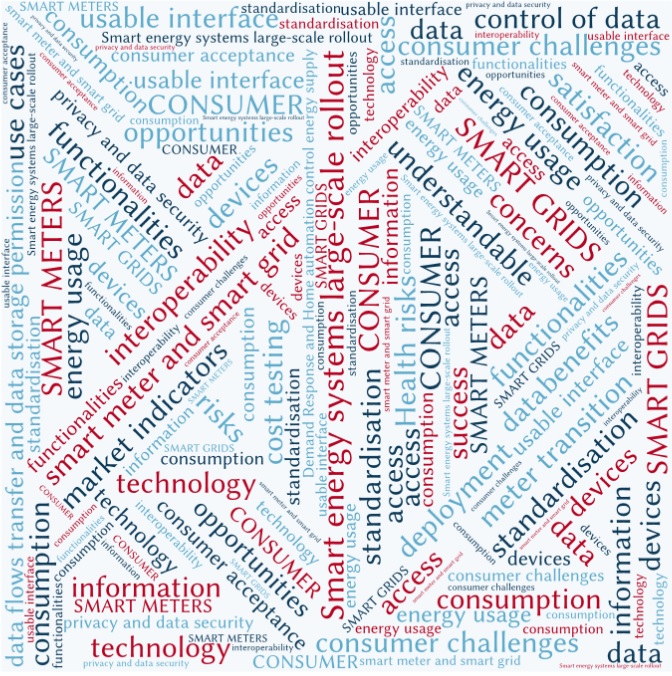
With the transition towards smart energy systems come new opportunities for consumers, but as with any new technology, increasingly sophisticated functionalities can result in unintended consequences. ANEC believes that consumers should be protected from the risks associated with new technologies and from control of data. Above all, consumers should be able to realise the benefits arising from smart energy systems.
In July 2015, the European Commission published a Communication Delivering a New Deal for energy consumers, emphasising that smart metering systems must be fit for purpose in terms of the functionalities available to deliver the required benefits for consumers. This includes technical interoperability, consumer access to their consumption data via an open standard, and non–proprietary interface. The Commission also stated that industry needs to finalise and apply standards and interoperability for in-home communication between a smart appliance and energy management systems to make it ready for demand response.
The three EC Smart Grids Task Force Expert Groups agreed on the final reports with recommendations on the principles and possible coverage for the new actions in the European legislative framework, to facilitate interoperability, cybersecurity and demand side flexibility. The deadline for completing smart metering roll out has been extended from 2020 to 2024. The final reports from the three groups were approved, in line with ANEC’s position.
On 26 September 2019, ANEC submitted comments on the EC sponsored draft report on benchmarking smart metering deployment in the EU. ANEC welcomed the detailed benchmarking work which should help to build on the lessons learned from previous deployments. Despite measures taken by Member States, there are still big challenges to get the required levels of consumer engagement. ANEC is pleased that the new requirements in Article 19 of the Electricity Directive include monitoring the deployment of smart meters to track the delivery of benefits to consumer. The Transition and Consumer KPIs, building on previous work by ANEC, are an essential part of tracking consumer benefits. Progress in implementing this KPI monitoring across Member States has been too slow and must now become a priority.
In April 2020 the EC published an Assessment and roadmap for the digital transformation of the energy sector towards an innovative internal market. The study puts an emphasis on the European Commission’s digitalisation policies, as well as assesses use cases enabled by further actions removing hindering factors, presents four policy scenarios describing such further actions and a roadmap identifying timelines for both actions and implementation.
In February 2021, CEN and CENELEC BTs merged the CEN-CENELEC-ETSI Coordination Group on Smart Meters (CG-SM) under the umbrella of the CEN- CENELEC-ETSI Coordination Group on Smart Energy Grids (CG-SEG). ANEC joined the newly merged CEN-CENELEC-ETSI Coordination Group on Smart Grids, upon its establishment in February 2021.
A new title of the group was approved to read 'CEN-CENELEC-ETSI Coordination Group on Smart Grids (CG-SG)'. The Ad hoc Group met in February 2021 and ANEC contributed to the drafting of the ToRs, making sure organisations such as ANEC will continue to be able to participate in the new structure. The revised Terms of Reference, reflecting the extension of the scope of the CG-SEG, prepared by an Ad hoc Group between interested members of both groups including ETSI representatives, were approved by both groups on 2021-03-30.
Work Areas
1) Access to consumption data
In order to achieve a greater involvement of consumers in their energy usage and management, consumers need to have free and easy access to a usable interface which provides understandable and usable information on current and historical consumption. It is therefore important for standards to ensure that smart metering systems support the communication of relevant information to the consumer interface, i.e. an in-home display. Smart metering systems should be fit to update consumption data frequently enough and make it available to consumers as the European Commission has recommended in the 10 minimum common functionalities.
2) Interoperability
A lack of interoperability within the smart grid system inhibits competition and reduces consumer benefits. Our concern on interoperability is the risk of loss of functionality for consumers from end devices when they change supplier, when the meter is changed or when the system is upgraded. Possible knock-on effects can be an increase of cost when interoperable end devices need to be replaced and a loss of information needed to manage one’s energy consumption. This may trigger a reduction in consumer engagement. A clear programme of end-to-end testing would ensure interoperability of the system and end devices.
3) Privacy and data security
Consumer concerns around privacy and data security are likely to create problems for consumer acceptance and engagement. ANEC therefore calls for the consumer requirements on data privacy and international best practices to be fully reflected in the development of use cases and standards for smart metering and smart grids. Organisational processes relating to data flows, data transfer and data storage across the whole system should be considered. Data which is not required to fulfil billing or regulatory purposes should not be collected without the express permission of the consumer. High profile stories about risks of detailed consumption data being used for consumer profiling can damage consumer confidence and engagement. There is a need for adequate redress mechanisms to ensure that privacy breaches are detected, investigated and satisfactorily resolved.
4) Monitoring consumer benefits
Although the use of minimum functionalities for smart meters and interoperability is important, we think these will not be enough to ensure active consumer participation in the smart energy market. We therefore published the position paper 'Monitoring the success of smart metering deployment from a consumer perspective' to propose possible measures that could be used to assess whether the smart meter deployment is truly benefitting consumers.
We believe smart meters can become a success story for consumers if they: (1) have easy access to usable consumption information, (2) have a high level of satisfaction with smart metering deployment, (3) are able to realise benefits from smart meters and (4) are engaged in the smart energy market. The paper further proposes a set of indicators to measure whether these outcomes are met. We are pleased that the European Commission has taken into account our proposals and has commissioned a study on this issue largely based on ANEC’s position paper.
5) Demand Response and Home automation: control of energy supply
Consumers, in particular vulnerable consumers, can be disadvantaged by measures that encourage Demand Response and home automation. These can be used to send information and signals to cause electrical power-using devices to be turned off during periods of high demand. ANEC considers that supply should be restricted, or appliances controlled, only with the expressed consent of the consumer. Also, Time of Use tariffs and peak time pricing can result in additional complexity which makes it more difficult for consumers to choose the best tariff and supplier. ANEC believes disadvantaged consumers need to continue to have access to the energy they require at a price which they can afford, and should not be penalised because they are unable to change their consumption patterns.
6) Health risks
Potential concerns around the safety of devices and components should be addressed, including the risks from increased exposure to radio frequency emissions, which could have detrimental health impacts especially for the elderly, children and those with electromagnetic hyper-sensitivity.
Activities in the European & international standards bodies
ANEC is represented in, or monitors, the work of various Technical Committees dealing with energy issues:
- CEN/CENELEC Ecodesign Coordination group Task Force 2
- CEN/CENELEC Ecodesign Coordination group Task Force 6
- CEN/CENELEC JWG 10 'Energy-related products - Material Efficiency Aspects for Ecodesign'
- CEN-CENELEC TC 10 WG 2: ‘Durability’
- CEN-CENELEC TC 10 WG 3: ‘Upgradability, Ability to repair, Facilitate Re-Use, Use or re-used components’;
- CEN-CENELEC TC 10 WG 4: ‘Ability to re-manufacture’
- CEN-CENELEC TC 10 WG 6: ‘Documentation and/or marking regarding information relating to material efficiency of the product’
- CEN-CENELEC TC 10 WG 8 : ‘Circular design’
- CEN TC 109 ‘Central heating boilers using gaseous fuels’
- CEN TC 57 ‘Central heating boilers’
- CLC/TC 59X ‘Performance of household and similar electrical appliances'
- CEN TC 113 ‘Heat pumps and air conditioning units’
- CEN TC 312 ‘Thermal solar systems and components’
- CLC TC 34A ‘Lamps’
- IEC TC 34 ‘Lamps and related equipment’
- CLC TC 100X ‘Audio, video and multimedia systems and equipment and related sub-systems’
- IEC TC 100 'Audio, video and multimedia systems and equipment'
- CEN TC 295 ‘Residential solid fuel burning appliances’
- CLC TC 61 WG 6 ‘Surface cleaning appliances
- CEN-CENELEC-ETSI Coordination Group on Smart Grids (CG-SG)
- IEC TC 59 WG 15 'Connection of household appliances to smart grids and appliances interaction'
- CEN-CENELEC-ETSI Sector Forum 'Smart and Sustainable Cities and Communities' (SSCC-SF)
- CENELEC/TC 59X ‘Performance of household and similar electrical appliances’
- CENELEC/TC 59X/WG 1 ‘Laundry appliances’
- CENELEC/TC 59X/WG 7 ‘Smart appliances’
- CENELEC/TC 59X/WG 2 ‘Dishwashers’
- CENELEC/TC 59X/WG 6 ‘Vacuum cleaners’
- CENELEC/TC 59X/Ad-hoc WG 22 ‘Consumer-relevant testing’
- CENELEC/TC 59X/WG 23 ‘Material efficiency of household and similar electrical appliances’
European Commission groups:
- European Commission’s Ecodesign Stakeholder Consultation Forum
- European Commission Smart Grid Task Force
- European Commission Joint Meeting of Member States Groups on Integrated Product Policy (IPP/SCP) and Resource Efficiency
- European Commission Integrated Product Policy (IPP/SCP) subgroup on the Environmental Footprint Transitions phase
Highlights
ANEC paper on Ecodesign requirements for computers
Personal computers have become an indispensable appliance in daily life. From an environmental perspective, there are benefits to digitalisation, starting with reduced paper consumption. But our computers might not be as energy and materially-efficient as we think. In our position paper (https://tinyurl.com/3wjb5f88), published on Zero-Emission Day (21 September), we argue that the current Ecodesign regulation on computers is insufficient, and significantly more savings could be achieved with a revised regulatory framework.

One of the largest missed savings comes from not tackling energy efficiency when computers are working, the reason being that there are no standardised test procedures.
ANEC therefore calls for a revision of the Ecodesign Regulation on computers, to ensure that requirements will be robust enough to improve the performance of computers and make a difference in the energy savings for consumers. We also call for the development of a new standards for computers and servers that should exhibit sufficient robustness over time, so that consumers are always provided an accurate idea of how much energy their new products will use under different use functions.
Cooking appliances
In collaboration with BEUC, we developed our contribution to a consultation on Ecodesign and energy labelling of cooking appliances (https://tinyurl.com/4f48fdc2) that ran until the end of August.
In our response we request the Commission to initiate a debate on potentially phasing-out the sale of gas cooking appliances in the EU under these regulations.
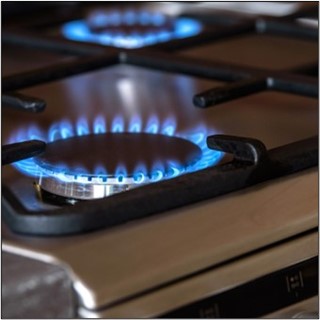
We continue discussing with our members the advantages and disadvantages of a phase-out. It could potentially also introduce improvements to indoor air quality, in addition to energy savings. Several studies, including the CLASP/ECHA study "Exposing the Hidden Health Impacts of Cooking with Gas" (see https://bit.ly/3GRI1Yr) to which ANEC also contributed, show how all gas cooking appliances release pollutants that are harmful to human health and the environment, polluting our households with high-risk levels of PM2.5 and/or NO2. Until a phase-out happens, we believe the EC should introduce NO2 and CO limit values in line with WHO guidance.
Ecodesign of smartphones and tablets
The EC has approved new Ecodesign and Energy labelling Regulations for smartphones and tablets, set to take effect in June 2025. We welcome the stringent requirements aimed at enhancing the durability, repairability, and energy efficiency of mobile devices. These requirements encompass provisions such as improved resistance to drops, scratches, and environmental factors – including dust and water - as well as the use of long-lasting batteries.
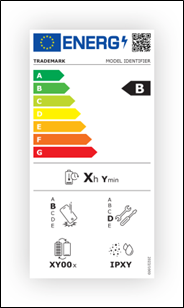
Image from Commission website
Manufacturers will be obliged to make critical spare parts available to repairers within specified timeframes, up to 7 years after a product's market debut. Additionally, devices must receive operating system updates for a minimum of 5 years post-market launch. Furthermore, an energy label will display information on energy efficiency, battery life, and device durability, including – for the first time - a repairability score. For further details, refer to the Commission's communication (https://tinyurl.com/37hn27m6).
In collaboration with BEUC, ANEC contributed (https://tinyurl.com/k68hmyv2) to the development of these measures. As of 2024 ANEC participates on the development and implementation of the standardisation request in support of these regulations.
ANEC-BEUC Webpage dedicated to Ecodesign and Energy Labelling
ANEC and BEUC set up a dedicated webpage to highlight the benefits of Ecodesign and Energy Labelling policies for consumers. This webpage also details the ongoing legislative initiatives on this policy field and our work to reduce the environmental impact of products and make the sustainable choice the easy one for all.
ANEC-BEUC show Ecodesign savings
A study by ANEC & BEUC confirms how crucial it is to safeguard Ecodesign. Indeed, a typical household saves at least €330 annually thanks to Ecodesign, and by doing nothing! This is because Ecodesign requires manufacturers to produce less energy-hungry products. If consumers choose the top class of the Energy Label, their savings can jump to over €450 per year.
In addition to the economic benefits, Ecodesign delivers qualitative benefits to consumers such as quieter vacuum cleaners. The study also highlights that savings for consumers could be far higher if Ecodesign requirements were more ambitious and timely in their delivery.
- Our factsheet
- ANEC/BEUC study executive summary
- The full ANEC/BEUC study
BEUC updated this study in 2023: the report is available http://tinyurl.com/28bd99sr. It shows that the energy cost savings from Ecodesign average around €650 per year in total across the lifetime of the products. This increases to €1 800 per year for energy labelling. The majority of these savings come from increased efficiency of space heating products, and to a lesser extent lightbulbs.
Privacy and security in smart metering
The CEN-CENELEC-ETSI Smart Meters Coordination Group has published its fourth report on privacy & security. It includes a summary of minimum security requirements, an update on the European Commission’s work in this field and the status of European security standardisation.
ANEC commented on the draft, noting that ongoing work to strengthen privacy will be required alongside the testing of data protection measures. We also highlighted the current approach for addressing security issues in standardisation relies on Member States notifying standardisation bodies, and is therefore entirely reactive. We therefore recommended a more proactive approach whereby the Smart Meter Coordination Group actively seeks information from Member States on security and privacy issues that impact standardisation.
The report has been launched together with the “Report on Minimum Security Requirements for smart metering” and the Repository with links to the original requirements from member states with the minimum requirements. For more see here.
ANEC participated in the development of an information standard on material efficiency aspects for Ecodesign. Published by CEN and CENELEC in March 2019.
ANEC participated in the development of an information standard that was developed by the CEN-CENELEC Joint Technical Committee 10, whose Secretariat is held by NEC, the Dutch Electrotechnical Committee.
As context, with increasing and unsustainable speed, several of the earth’s natural resources are being depleted at an unstainable rate. To try to mitigate these negative environmental impacts, the European Commission introduced a number of initiatives and legislative measures, including the introduction of a Circular Economy Action Plan. At the core of circularity and resource efficiency are raw materials and how the use of these are managed. These materials are crucial to the European Economy. Therefore, providing information on the use of raw materials (named critical raw materials) within energy-related products will consequently facilitate the move to a more circular economy. In line with this, appropriate information is key for consumers (and industry) to maximise the potential for utilising materials contained within products effectively.
This is where standards can play a key role. ANEC worked on the development of EN 45559:2019 ‘Methods for providing information relating to material efficiency aspects of energy-related products’. EN 45559 establishes a general method, including rules and formats, for the provision of information related to the material efficiency aspects of energy-related products. This general method is planned to be used as a basis to develop product publications. It provides guidelines on how to gather all relevant information on material efficiency aspects in a structured way. It also accounts for data sensitivity, the target audience and the most suitable communication method. Overall, EN 45559 supports the development of effective communication strategy for material efficiency, ensuring effective communication by the information provider and, in return, increasing the likelihood of good understanding by the receiver of that information. ANEC continues to be actively involved in the work of JTC10 in other topics and looks forward to the revision of this standard to incorporate the information gathered in the other JTC10 working groups.
Publications
To access position papers related to Energy, please click the link, Position papers.
